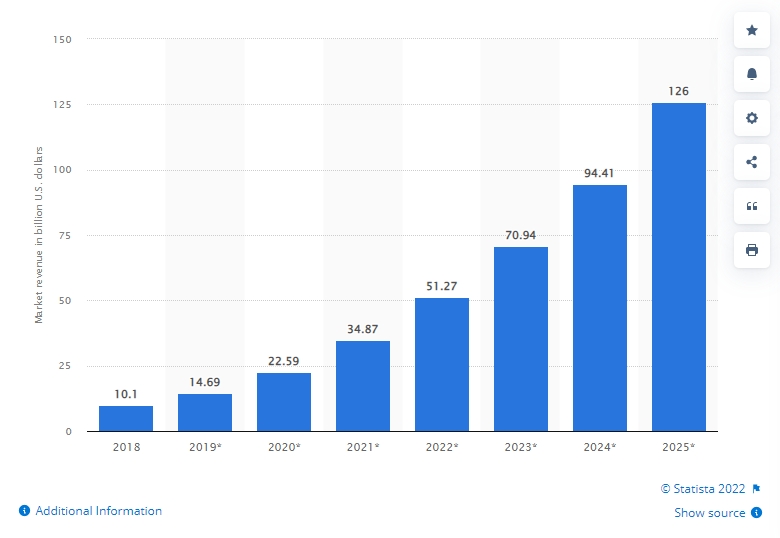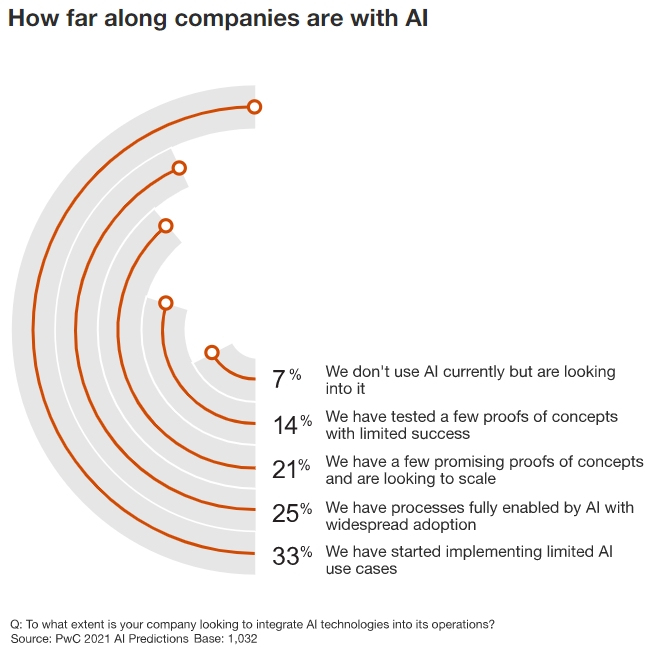Artificial intelligence, or AI, has been around for decades. Although we’ve come a long way in the AI field, there’s a lot of room for growth. With the rise of AI in all aspects of business, there’s a lot of controversy surrounding the ethics of AI in marketing. Here’s what you need to know about AI ethics and why it matters to your brand.

What Does Ethics of AI in Marketing Mean?
If you’re familiar with AI in Marketing, you know that it’s a digital marketing tactic that uses machine learning and data mining to help you target your audience, identify genuine leads, and gain insight into how your audience interacts with your brand online.
AI tools have become a must-have for brands globally, with the market revenue of the AI software market expected to reach $51.27 billion in 2022 and grow to 126 billion by 2025.

Source: Statista
As AI becomes more sophisticated, marketers have to make decisions regarding the ethical implications of using this tool in their work. That’s where the ethics of AI in marketing comes in. It’s about understanding how AI can be used to help your business and what the potential risks are.
AI ethics in marketing is about making sure that the use of AI in your marketing is ethical and doesn’t cause any harm to your business or your audience.
Ethics of AI in Marketing: Common Challenges Businesses Face
Businesses are already using artificial intelligence (AI) across the globe. But while AI has been proven to be incredibly useful, there are some ethical issues that businesses need to be aware of before they deploy this technology.
With approximately 58% of U.S. companies stating that they use AI in some capacity in their business, it’s crucial to understand that AI is still a work in process. While it’s come a long way in recent years, business teams everywhere are still finding that there are several challenges they must overcome when implementing AI into their strategy.

Source: PWC
Some of the most common challenges brands face today include the questionable ethics of AI in marketing.
Excessive Amounts of Bias and Prejudice
AI systems can be built with inherent biases or programmed to learn from existing biases. As a result, a lot of AI is still heavily biased and prejudiced, which makes it difficult for a business to accurately market to their audience.
Privacy Concerns
Privacy is another concern that arises when it comes to AI in marketing. With so many businesses leveraging AI technology, there’s a lot of data being collected and stored. This can be a major concern for customers and consumers, especially when they aren’t made aware of how their data is being used. The need for transparency and the right to privacy are both important factors to consider when implementing AI into your marketing strategy.
Mass Amounts of Disinformation
One of the most controversial issues surrounding the ethics of AI in marketing is the potential for AI to spread disinformation. AI systems are often designed to learn from the data they’re exposed to, which means that if a large quantity of AI is exposed to false information, it can potentially cause a lot of damage in the long term. This is especially concerning for businesses trying to build brand awareness and trust with their audience.
5 Ways to Prioritize Ethics of AI in Your Marketing Practices
As artificial intelligence (AI) continues to get smarter and wiser, it has the potential to revolutionize marketing. However, it comes with a series of ethical questions. There are different ways to use AI, and some of them are better than others. Here are five ways to prioritize the ethics of AI in your marketing practices.
1. Prioritize Transparency
When implementing AI into your marketing strategy, it’s advantageous to let your audience know how your AI operates and how it works. It can also help you explain why your AI made certain decisions, which will help further explain your brand’s mission and vision.
2. Only Collect Sensitive Data When Necessary
One way to prioritize the ethics of AI in your marketing practices is by only collecting the most necessary data. This is important because you don’t want to collect sensitive data that could potentially cause privacy concerns.
You don’t want to be constantly asking your audience for sensitive information when it’s not necessary because it can lead to distrust between you and your audience.
3. Explain to Your Audience What Customers Get for Sharing Data
Asking for your audience’s data is a sensitive subject, so explaining the benefits of sharing data with your brand is crucial. This can help build trust and brand awareness. It also gives your audience a better understanding of how your brand works and what they’re trying to accomplish.
4. Give Your Audience Complete Control Over the Data You Collect
You should also consider giving your audience complete control over what data is collected. It shows your audience that you’re willing to prioritize their privacy. It also gives your audience a better understanding of your brand’s decisions and how AI impacts their lives. This helps your audience feel more comfortable with the decisions that are being made.
5. Always Respect Audiences Preferences!
Respect your audience’s preferences regarding data collection. Your audience is the most critical factor in your business, so it’s vital to prioritize their preferences. By respecting your audience’s preferences, you can show your audience that you’re willing to be transparent and prioritize their privacy.
Put AI to Good Use with Hushly
Artificial intelligence is becoming a permanent staple in business today. To make sure you’re staying in line with the ethics of AI in marketing, you need to be aware of how your business is using AI and make sure you are not abusing it.
Here at Hushly, we help you implement AI into your marketing strategy in the right ways to ensure you’re staying in line with the ethics of AI in marketing.
Ready to see how Hushly can put AI to work for you? Request your demo today!

